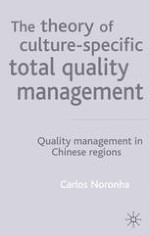2002 | Buch
Über dieses Buch
This volume is the first to show the influence that culture has on the success of TQM, and uses the case of Chinese companies operating in mainland China, Hong Kong and Taiwan to support the assertion that culture has a greater effect on TQM than has been previously acknowledged. This book will be compelling reading for students, researchers and professionals concerned with cultural diversity and alternative approaches to TQM.
Anzeige
